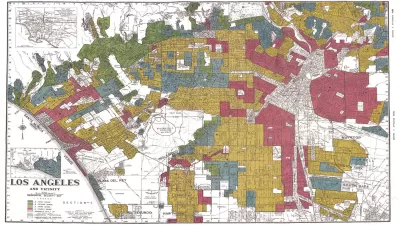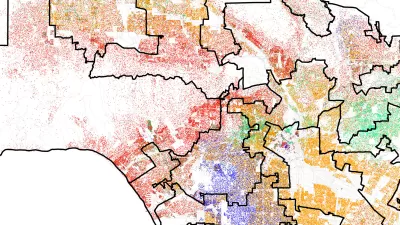A new study by PolicyLink and the University of Southern California's Program for Environmental and Regional Equity showed that U.S. GDP would expand by $2.1 trillion if racial minorities had equal access to opportunities within the job market.
Janie Boschma of the National Journal discusses the findings of a new report, "The Equity Solution," co-authored by PolicyLink and the University of Southern California. The report examines 150 major metropolitan areas within 50 states, each potentially gaining millions in additional annual revenue if residents of color were on equal footing as white residents in terms of average wages. The report also discusses each metropolitan area’s "root cause of racial inequality—how much of the income gap is attributable to a disparity in wages and how much to unemployment and underemployment.
For example, inequality in Santa Barbara, Calif., is mostly driven by a disparity in wages and could be addressed by raising wages or introducing more better-paying jobs. On the other side of the spectrum is Flint, Mich., where inequality is entirely caused by disparities in employment."
To alleviate these often expensive and deep-rooted social issues, the report’s authors "recommend several lower-cost legislative solutions, such as removing questions about criminal history on job applications, as well as enacting comprehensive immigration reform. But they acknowledge that more costly, high-return investments in public education and job training, as well as enforcement of civil-rights laws, would be necessary in order to make real progress in closing the racial income gap."
To inform individuals on data within their city and state, PolicyLink has also released their online visualization tool, the National Equity Atlas. In addition to providing average citizens knowledge on racial inequality in their home, PolicyLink hopes it will inspire action from government and community leaders.
FULL STORY: Eliminating Racial Income Gaps Would Boost GDP By $2.1 Trillion

Study: Maui’s Plan to Convert Vacation Rentals to Long-Term Housing Could Cause Nearly $1 Billion Economic Loss
The plan would reduce visitor accommodation by 25,% resulting in 1,900 jobs lost.

Alabama: Trump Terminates Settlements for Black Communities Harmed By Raw Sewage
Trump deemed the landmark civil rights agreement “illegal DEI and environmental justice policy.”

North Texas Transit Leaders Tout Benefits of TOD for Growing Region
At a summit focused on transit-oriented development, policymakers discussed how North Texas’ expanded light rail system can serve as a tool for economic growth.

San Diego County Sees a Rise in Urban Coyotes
San Diego County experiences a rise in urban coyotes, as sightings become prevalent throughout its urban neighbourhoods and surrounding areas.

Los Angeles County Invests in Wildfire Recovery for Parks, Trails, and Open Space
The $4.25 million RESTORE Program supports the recovery of parks, trails, and open spaces damaged by the January 2025 wildfires through targeted grants that promote community healing, wildfire resilience, and equitable access to nature.

Nevada Bills Aim to Establish Home Insurance Assurance Amidst Wildfire Risk
Republican sponsor hopes the FAIR plan would be “a true market of last resort.”
Urban Design for Planners 1: Software Tools
This six-course series explores essential urban design concepts using open source software and equips planners with the tools they need to participate fully in the urban design process.
Planning for Universal Design
Learn the tools for implementing Universal Design in planning regulations.
Alamo Area Metropolitan Planning Organization
City of Santa Clarita
Institute for Housing and Urban Development Studies (IHS)
City of Grandview
Harvard GSD Executive Education
Toledo-Lucas County Plan Commissions
Salt Lake City
NYU Wagner Graduate School of Public Service




























